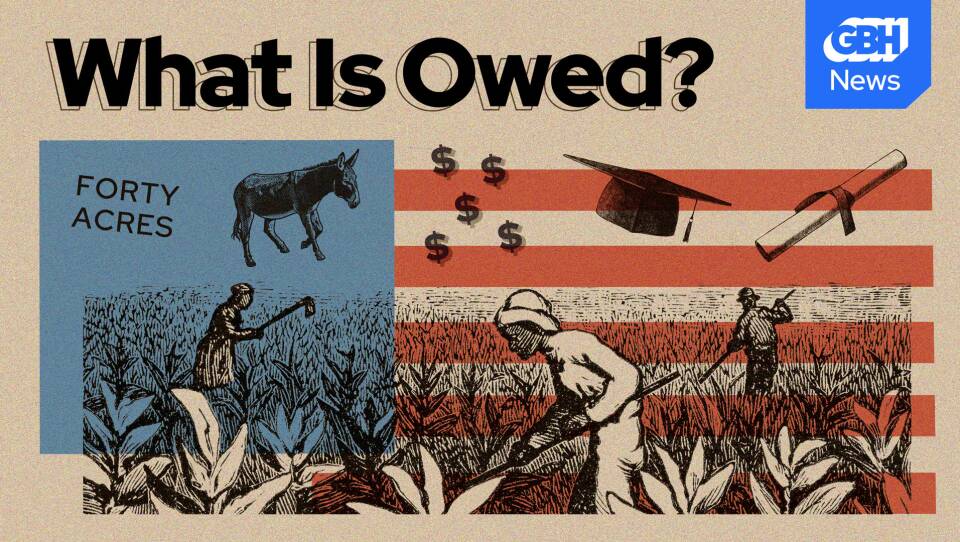What could reparations look like in America’s leading cities? The new podcast “What Is Owed?” will investigate the historical record and the discussions underway across the nation about reparations, starting in Boston, the capital of the first state to legalize slavery. Hosted by GBH News political reporter Saraya Wintersmith, the seven-part series premiered on Feb. 15, one year after Boston Mayor Michelle Wu appointed a Reparations Task Force to research the impact of 400 years of slavery and economic exclusion on the city. We spoke with Wintersmith and Lee Hill, executive editor for GBH News.

How did this podcast come to be?
LH: Saraya has been covering the conversation about reparations in Boston, and she has uncovered some true gems about the unique history of Boston and Massachusetts and their connection to slavery, as well as the role of leaders in Boston in shaping the national debate around reparations. I could see that we had a bigger story to tell that could have national resonance.
Why did you decide to present this reporting via a podcast?
LH: We knew that it was a story with many threads and many layers. There were multiple narratives and we knew it could be sound-rich. For instance, we have audio that's never been heard before of Bill Owens, who was the first Black legislator in Massachusetts in the 1970s. We have tape of him talking about these issues long ago.
What are some highlights of the podcast?
LH: The podcast travels to Ghana, West Africa, which was the point of no return where many Africans were captured and forced into chattel slavery. The podcast also travels to Evanston, Illinois, which is the first place in the United States to implement a reparations framework. We also look to other examples of atonement. We look at what happened with Japanese internment and at Austria's reparations for Jewish people. In looking at those different models, we try to glean what Boston and the United States overall might learn from these efforts.
What did it mean to you to be part of this project?
LH: Reporting on the horrors of slavery and how it devastated the Black diaspora for generations is not lost on me as an African American news executive. It's not lost on Saraya as a Black reporter. It's really something to be working on this sort of project that does feel intersectional in some ways to our identity — it’s different than just covering City Hall and politics in Boston. This project feels deeply personal.
Why is this a good time for this reporting?
LH: It seems like Boston is trying to heal itself. “The Embrace” statue was unveiled a little over a year ago on the Boston Common, where Black people haven't even always felt welcomed. The NAACP National Convention returned to Boston over the summer for the first time in more than 40 years. Mayor Wu apologized to Black Bostonians for the negative treatment and effects brought on by how the police handled the Charles Stuart case. This podcast is entering the world as Boston is going through a time of trying to be a better version of itself.
SW: Boston is just one of many places across the country that's now open to exploring its own culpability in slavery. It's a momentous thing for the government to say we have to own up to this, we have to face this.
What makes this podcast a good fit for GBH?
LH: This podcast, as part of GBH’s Reckoning + Repair initiative, underlines the power of all production units of GBH lining up behind one idea to tell a variety of different stories in a really meaningful and substantive way.
“What Is Owed?” is a co-production of GBH News and PRX and is distributed by PRX, one of the world's top podcast publishers and public radio distributors. “What Is Owed?” is available free on demand across all major podcast platforms, as well as at the GBH News website and the GBH News YouTube Channel. Episodes will be released weekly on Thursday mornings.
Listen to more from Saraya Wintersmith about “What Is Owed” here.Meet the podcast creators in a special launch event at the GBH Boston Public Library Studio on Thursday, Feb. 22, at 5:30 pm. More details here.




